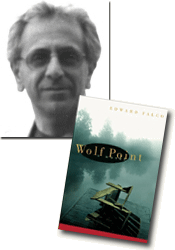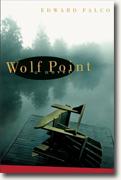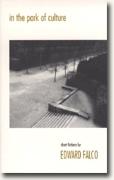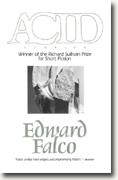 An Interview with
An Interview with
Edward Falco
Interviewer Luan Gaines: Was your novel inspired by actual events?
Edward Falco: No. The characters and the events are all invented. All of my writing, however, comes out of experience, by which I mean that I draw on the experiences of my own life in order to create the characters and describe the events of a story. The setting of Wolf Point, for example, is drawn from a place in the Thousand Islands called DeWolf Point, where I used to vacation; and the main character is approximately my age and there are parallels between his life and mine––though none of the dramatic events of the story ever happened to me, and I am, in most important ways, very different from my character. So, yes, there are bits and pieces of my life and experience that I use to tell this story; and, no, the story is not about me and it is not inspired by actual events.
T Walker is the perfect foil for the two hitchhikers, Jenny and Lester. Even he realizes the danger in picking them up. Why then, does he stop for them?
That’s a question that readers need to answer for themselves. Personally, I think T is depressed to the point of recklessness, and desperate for human interaction. Beyond that, I think he’s attracted to Jenny for complex reasons that he’s mostly unaware of.
T has a dark secret of his own, one he thankfully never reveals to Jenny. What are some of the reasons, besides the obvious, that T is drawn to Jenny’s youth and seductive beauty?
The novel is in part at least about just that question. Or, to put it another way, the novel explores that question. What is the nature of T’s attraction to Jenny? If you look at the dream scene in the third section of the novel, I think there are some images that suggest possible answers to the question. Clearly, Jenny’s youth and beauty exert a powerful attraction for T, and much of it is, as you say, beyond the obvious.
 As a reader, I know T is getting into big trouble with these hitchhikers, but he seems oblivious to threats, even putting his life in danger by choosing the situation. Why is your protagonist so removed from the consequences of his choices?
As a reader, I know T is getting into big trouble with these hitchhikers, but he seems oblivious to threats, even putting his life in danger by choosing the situation. Why is your protagonist so removed from the consequences of his choices?
Again, in my opinion it’s a reckless depression that drives him to seek any human interaction, and then, too, that attraction to Jenny.
As Walker talks privately to Jenny and Lester, they each reveal personal stories that prove them to be duplicitous and untrustworthy. Yet T wants desperately to connect on an emotional level with Jenny, maybe even with Lester. Why? Does he see her as a link to his children and/ or wives? Why/ why not?
Does T want to connect with Jenny—or does he hope to be saved by her? Does T want, altruistically, to help Jenny and Lester––or does he need to reform his battered sense of self by helping them? Is Jenny connected in his mind with the girl in the photograph, the one who has caused him so much trouble? Or is T just lost and groping for a way out of his sad life—and does he always look to women to provide direction, to give his life shape? Those are questions the novel explores, and whatever answers there are, are there in the novel for the reader to find.
Jenny is a skillful manipulator, yet obviously damaged. It often seems as though she is only acting out what a lifetime has taught her. At one point, she tells T that he wants something from her as well, even if he doesn’t think so. Has she read him correctly?
Well, I think she has. I think Jenny is very smart and insightful, and she reads T’s desperation and desire. I suspect her beauty has elicited similar responses from other men—maybe even from Lester. What do men want from women? What do they expect a woman to do for them? Again, these are question explored in the novel. Jenny has been dealing with male desire her whole life. What have the consequences been for her? For many women? Before the answers to those questions lead you to a simplistic reading of the novel, however, keep in mind that T himself was the object of female desire when he was very young, and that T wound up in an inappropriate relationship that very well may have had unintended consequences for him.
Lester is the more menacing of the two, obviously obsessed with Jenny, even to the point of holding a gun to T’s head. Why is T oblivious to the threat of Lester’s presence? How do the drugs complicate the shaky relationship of the trio?
I don’t think T is oblivious to Lester’s menace. I think he’s fully aware of the danger Lester presents. Why doesn’t he run away from that danger? I think Jenny is the answer there. He’s willing to risk Lester for Jenny. Drugs complicate everything by distorting our ability to see accurately and by encouraging reckless behavior.
 T is caught in a moral conundrum, which becomes clear later in the story, once a successful family man but now unmoored. Without giving anything away, what changes his perception of his place in the world?
T is caught in a moral conundrum, which becomes clear later in the story, once a successful family man but now unmoored. Without giving anything away, what changes his perception of his place in the world?
Well, without giving much of the story away, all I can say is that his experience with Lester and Jenny alters his understanding of his situation and pushes him toward change.
Walker is stubbornly entrenched in denial of his own actions, believing he has been grievously harmed by unfair circumstances. Why does it take him so long to make the obvious connections to his past and the young woman is he so drawn to?
Because it’s not obvious to T. T, throughout the novel, struggles, I think, to act honorably—though by his own standards, of course. It takes his experience with Jenny to help him see things differently.
The characters clearly define the class distinctions of our society, T far removed from the few options enjoyed by Jenny and Lester. Can you speak about why they might feel entitled to take what T has?
Jenny and Lester are also desperate—though in a different way than T. They have no money, no transportation, and their lives are in danger. I don’t think they feel entitled to T’s car and money: they just don’t have any other decent choices.
Lester is always the wild card, although at first it appears that Jenny is in control. What happens that passes the control to Lester?
Lester takes control through brute force, which is what some people will do when they run out of options.
Again, without giving the plot away, does Lester have the most accurate reading of his and Jenny’s true situation? What inspires his clarity?
That, again, is up to the reader to determine—whether or not Lester has the most accurate reading of the situation. Part of what should engage the reader in this novel is working out an understanding of the true situation. Readers have to sift through the perceptions of all three characters to come away with their own sense of the truth. I feel as though I know exactly what’s going on, exactly what the history is for Jenny and Lester—but to tell the reader that one character or another character has the one true version of events would be to suggest there is only one way to read the novel.
 Living half in the past and half in the moment, T manages to always be one step behind Jenny and Lester. Why is T constantly out of step?
Living half in the past and half in the moment, T manages to always be one step behind Jenny and Lester. Why is T constantly out of step?
I don’t think any of the characters know exactly what’s going on with the other characters. They are each trying hard to understand what’s going on with the others. They are each, in their way, trying to play each other. I think.
T’s moral ambivalence is revealed by his interactions with Jenny, vacillating from comforting to sexual, inconsistent from one minute to the next. Is this very ambiguity the reason Jenny is seduced by this older man?
Is Jenny seduced by T? Or does she simply need the guy’s money and stability? Is she desperate for someone like T to come along and put her life straight? Is she really attracted to him—or is attraction beyond the point when all you want is one chance at a decent life?
Is Lester more threatened by Jenny’s emotional attraction to T than the threat of physical intimacy? Why/ why not?
It would seem, to me at least, that Lester is most upset by the possibility that Jenny is really interested in T on some intimate level. And also by the possibility that T is simply taking advantage of Jenny’s desperate situation. Lester seems particularly upset by the thought of T having sex with Jenny when he knows that sex hurts her. There are bigger implications there. Lester may also be fed up with the abuse of the weak by the powerful, particularly as he must feel especially weak in his situation.
Your novel is perfectly balanced in the parallel universes of the characters, illustrating how much human nature has in common despite obvious differences. But T is protected by his wealth, while Jenny and Lester are vulnerable in their desperate circumstances. In that respect, how does class protect T from personal culpability?
T, being well-off, has a different set of problems from people like Lester and Jenny, who were born near the bottom of the class ladder and have had to struggle to get up a rung or two. T’s middle class upbringing paved the road for him in life. Jenny and Lester started out on the barest of dirt roads. T’s class background does not protect him from personal culpability—but it certainly provides him all manner of opportunities not available to Jenny and Lester.
What would you like readers to come away with after reading Wolf Point?
I’d like them to come away thinking about the story and all the various issues it raises. I hope they will think some about sexual desire as a primal force, with the power to destroy as well as create. I hope they’ll come away thinking about personal responsibility for the direction of a life––and for responsible behavior toward others. I hope they’ll come away with some sympathy for all the characters. If I’m lucky, they may even spend some time thinking about that red guitar and what makes it important in the novel.
 Are there any particular authors who have influenced your work?
Are there any particular authors who have influenced your work?
The great American writers: Melville, Hawthorne, Poe, Emerson, Stephen Crane, all of the writers I’ve read and studied throughout my career, to one degree or another.. Many poets. Among contemporary writers: Raymond Carver in fiction, David Mamet in playwriting, and, again, many contemporary poets. I’ve just been reading Stuart Dybek’s latest collection of short stories, I Sailed with Magellan, and, as always, the guy’s an amazingly good writer.
Are you currently working on another project? Can you share something about it with us?
I’m working on a play called Possum Dreams. Actually, I’m working on trying to find a venue for it. I just finished a new short story called “Wild Girls,” and I just read a short story called “Places, Please” for Daren Wang’s new audio journal, Verb.
What advice do you have for would-be writers?
Read. Think about what you want from your life as a writer. If you want fame and fortune to come from your writing, you should follow a very different course from someone who wants to use language as a way explore life through stories.
Edward Falco was born in Brooklyn and teaches at Virginia
Tech University in Blacksburg, Virginia. He's the prize-winning author
of Sabbath Night in the Church of the Piranha: New and Selected Stories,
along with two previous collections, Plato at Scratch Daniel's and
Richard Sullivan Prize winner Acid, and a novel, Winter in Florida.
Contributing reviewer Luan Gaines interviewed Edward Falco, author of Wolf Point (see accompanying review), about his book via email for curledup.com. No part
of this interview may be reproduced without permission. Luan Gaines/2005.





